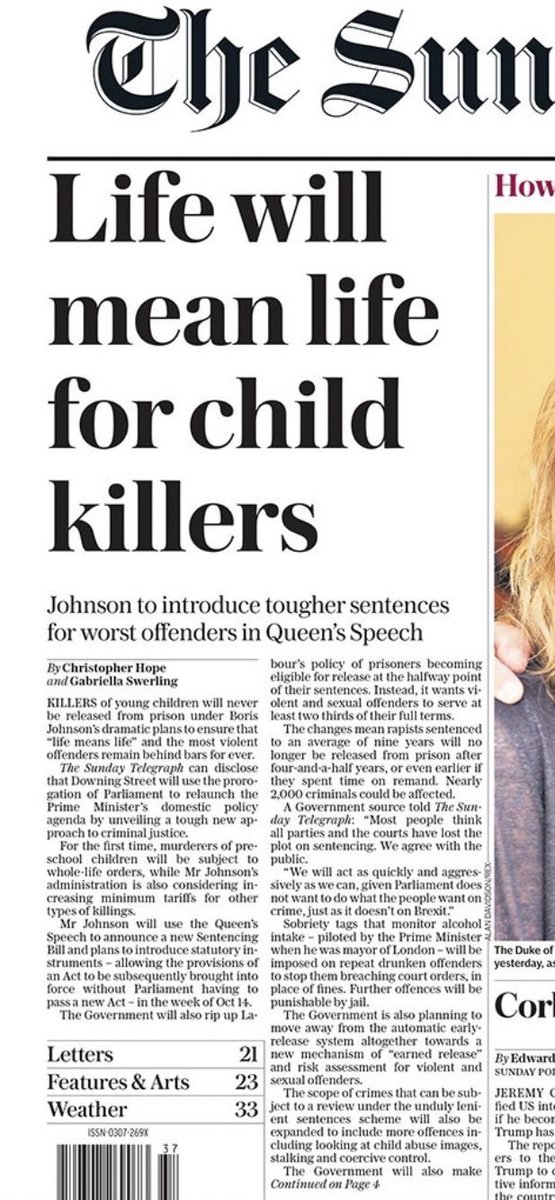
I’m probably going to regret this but here is a long thread about the Parole Board decision in Tracy Connelly's case. This is a difficult case which arouses very strong feelings. It's understandable that people are troubled by it.
I hope most people would agree that there are good reasons that we have a legal system. Decisions about parole are part of a legal/judicial process. Sentencing and parole are different things.
Tracey Connelly was sentenced to imprisonment for public protection (IPP). An IPP sentence (like a life sentence) includes a minimum term ('tariff') which is imposed by the sentencing judge.
Once a minimum term is served, detention is 'preventative' only. The Parole Board are the judicial body who have to apply the legal test set by Parliament.
The legal test is whether further detention is necessary to protect the public from serious harm. The revulsion or disgust people feel about an offence is not part of this test. It is about dangerousness at the time the case is considered.
Tracey Connelly’s minimum term of 5 years ended in 2012. She was released in 2013 but recalled in 2015. She had not committed another offence but there were concerns about her behaviour and she had breached the terms of her licence.
She has been in custody since her recall in 2015. Three Parole Board panels decided she did not meet the release test. Each panel is required to consider her case afresh and decide whether the release test is now met.
At her most recent hearing last month, oral evidence was given by four professional witnesses who gave risk assessment evidence on behalf of the Secretary of State. Their unanimous views were that her risk would now be manageable on licence in the community.
The Secretary of State’s officials who gave evidence were a prison psychologist, a prison-based and a community probation officer and an officer from a new specialised probation dept, the National Security Division (responsible for supervising her in the community).
Every one of the Secretary of State’s officials supported her re-release on licence with highly restrictive licence conditions. They had all concluded that she met the release test set by Parliament.
The Secretary of State had an advocate at the hearing. He was not present himself. He or his officials are free to make any submissions or call any evidence they wish at a parole hearing.
Very shortly after the release decision was circulated, he declared that he had issued a legal challenge. This announcement was timed to coincide with publicity for plans to 'reform' the Parole Board.
The Justice Secretary’s reform plans include a new appeal body to include himself. It is not clear what training or experience qualifies him to perform this task.
The Secretary of State’s application for reconsideration was rejected. This was a judicial decision made by a very experienced judge, applying a legal test. It is a detailed, reasoned decision. You can read it here:
bailii.org/ew/cases/PBRA/…
bailii.org/ew/cases/PBRA/…
The Secretary of State responded via Twitter:
"Tracey Connelly’s cruelty towards her son, baby Peter, was pure evil. The decision to release her demonstrates why the Parole Board needs a fundamental overhaul – including a ministerial check for the most serious offenders"
"Tracey Connelly’s cruelty towards her son, baby Peter, was pure evil. The decision to release her demonstrates why the Parole Board needs a fundamental overhaul – including a ministerial check for the most serious offenders"
What Raab is saying is that only he (or perhaps one of his colleagues) is really capable of making difficult decisions like this. He knows better than all of the professionals who have worked directly with her and witnessed her day to day behaviour.
Raab is saying that he is better placed to make this difficult decision than any of the Parole Board members who closely examined and interrogated the evidence.
It is hard to imagine anyone reacting with anything less than revulsion and disgust at the actions which caused this poor child's death. Understanding how and why people commit such terrible acts should be the highest priority.
A government committed to minimising harm would pay close attention and plan their policies around an analysis of why people commit terrible, harmful acts.
It is hard to escape the conclusion that Mr Raab is using this case for political reasons. He is part of a campaign which is deliberately focusing on lawyers and their application of the law.
Presumably the Conservative party and their advisers hope that attacking lawyers and judicial decisions will help them defeat Starmer's Labour Party and lay the groundwork for leaving the European Convention on Human rights.
I hope the Justice Secretary is spending as much time trying to understand why people commit terrible and harmful acts and supporting policies which really address this. This is a complex problem which requires long-term analysis and planning.
Building lots of prisons and blaming courts, Parole Boards and lawyers will not solve serious and complex social problems. But perhaps it might win some votes. Thanks for reading this. ENDS
• • •
Missing some Tweet in this thread? You can try to
force a refresh




